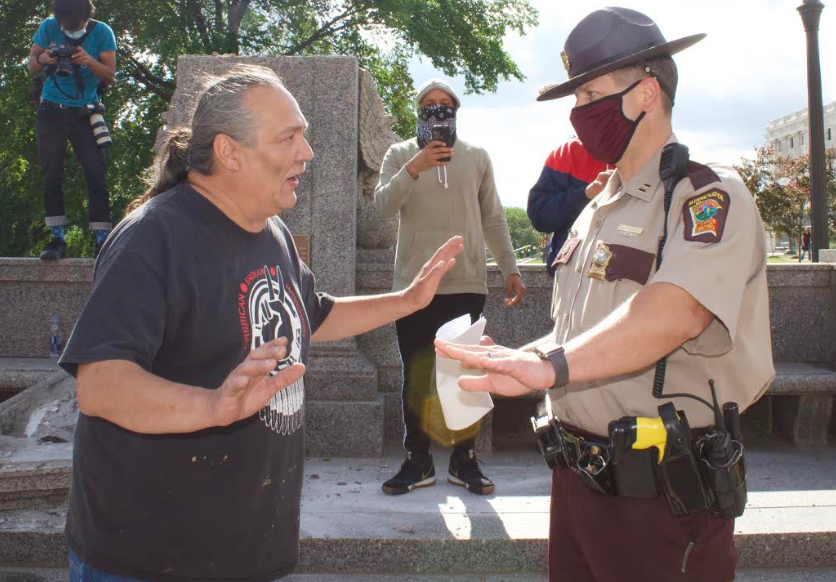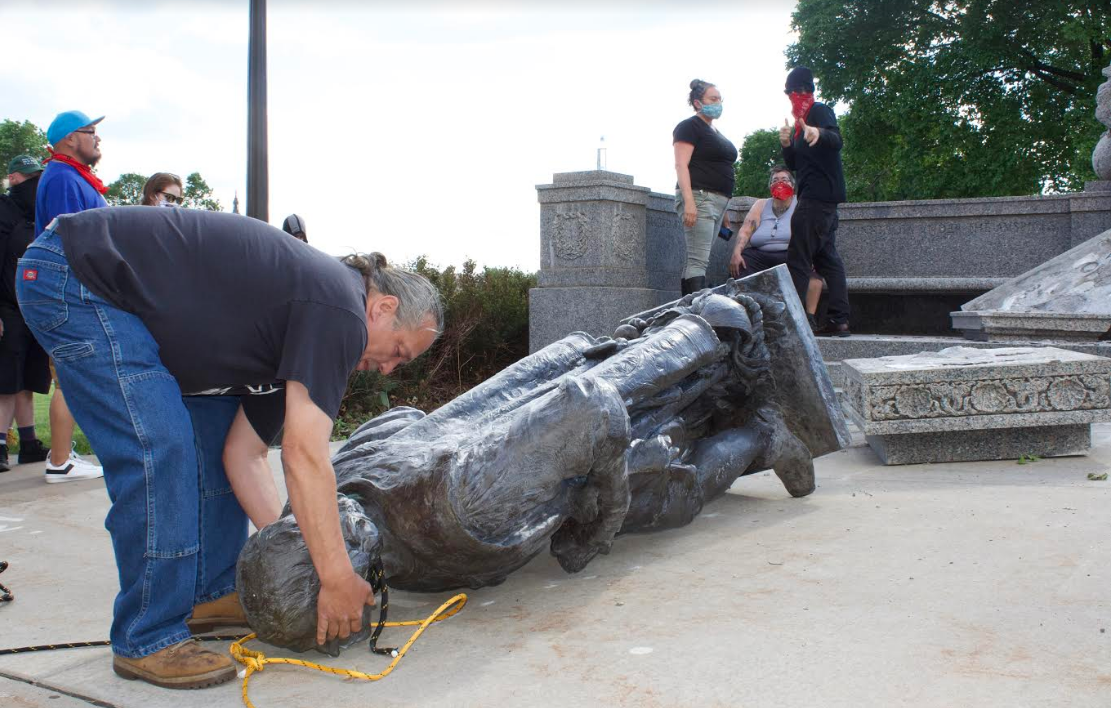
- Details
- By Darren Thompson
SAINT PAUL, Minn. — Nearly two months after the Christopher Columbus statue at the Minnesota State Capitol grounds was toppled, the Ramsey County Attorney’s Office is anticipated to charge three people with criminal damage to property in the first degree.
According to Defense Attorney Jack Rice, one of the people expected to be charged in the toppling of the Columbus statue is Mike Forcia, an enrolled tribal citizen of the Bad River Band of Lake Superior Chippewa (Wisconsin). The two other names have not been disclosed yet.
Credited as the lead organizer, Forcia is seen cheering as the statue met pavement, but there is no footage of him actually pulling the statue down.
Those who attended the event on June 10 tied two ropes to the statue’s neck and pulled it down with no resistance from the Minnesota State Patrol while multiple news sources streamed the event live on social media.
According to Mike Forcia, Gov. Tim Walz, Lt. Gov. Peggy Flanagan and Saint Paul Mayor Melvin Carter were called and invited to help pull the statue down hours before.
“I told each of them that we will save room at the front of the ropes for them,” Forcia said. “No show. None of them.”
“We prayed, we sang, we danced, we laughed and we cried,” he added. “It was a beautiful thing.”
State officials acknowledged that they had at least two hours’ notice before the statue was taken down according to FOX 9.
According to Rice, state investigators are looking for the names of everyone on the rope and the ropes that were used to pull the statue down.
 Mike Forcia was present when the statue of Christopher Columbus was toppled on the grounds of the Minnesota State Capitol in Saint Paul, Minn. on June 10, 2020.
Mike Forcia was present when the statue of Christopher Columbus was toppled on the grounds of the Minnesota State Capitol in Saint Paul, Minn. on June 10, 2020.
The toppling of the statue made national headlines and sparked cities across the United States to remove symbols of oppression and racism in public spaces, including statues of Christopher Columbus and Confederate monuments in cities such as Baltimore, Chicago, Richmond, Sacramento, Columbus and more.
“We have to ask ourselves a lot of questions about what we have done as a society and what we have done to particular members of our society,” said Rice. “What happened in Mike’s case highlights that point of those who have been ignored by society.”
Emphasizing an aspect of the case, Rice noted that “there are plenty of people who couldn’t care less if they are hurting a good portion of our society.”
“Society has proven its carelessness of the concerns of Indigenous peoples again in the simple matter that the statue should go back up,” he said.
Rice is a criminal defense attorney who has more than two decades of experience in practicing law. He’s a former special agent with the Central Intelligence Agency, former prosecutor and an internationally known journalist and television commentator.
“This case speaks to a much greater realm and I’m particularly honored to stand next to Mike in this case,” Rice said.
“They are filled with hate, ignorance and racism,” Forcia said. “Now we have to make them see why [removing the Columbus statue] was so beautiful, healing and necessary.”
Criminal damage to property in the first degree is a felony in Minnesota punishable by up to five years in prison, with the possibility of fines reaching up to $10,000.
This is a developing story.
More Stories Like This
Native News Weekly (August 25, 2024): D.C. BriefsNavajo Nation Secures $285 Million in Federal Broadband Funding to Connect Thousands of Homes
Oral History Project Announces 18th Stop in Denver, Colorado: NABS Continues Preserving Critical Stories Across Indian Countr
Next on Native Bidaské: Protecting Legacy Before It’s Forgotten with the National Native American Hall of Fame
Zuni Youth Enrichment Project Wins $25,000 National Award to Strengthen Long-Term Support for Zuni Youth
Help us defend tribal sovereignty.
At Native News Online, our mission is rooted in telling the stories that strengthen sovereignty and uplift Indigenous voices — not just at year’s end, but every single day.
Because of your generosity last year, we were able to keep our reporters on the ground in tribal communities, at national gatherings and in the halls of Congress — covering the issues that matter most to Indian Country: sovereignty, culture, education, health and economic opportunity.
That support sustained us through a tough year in 2025. Now, as we look to the year ahead, we need your help right now to ensure warrior journalism remains strong — reporting that defends tribal sovereignty, amplifies Native truth, and holds power accountable.
 The stakes couldn't be higher. Your support keeps Native voices heard, Native stories told and Native sovereignty defended.
The stakes couldn't be higher. Your support keeps Native voices heard, Native stories told and Native sovereignty defended.
Stand with Warrior Journalism today.
Levi Rickert (Potawatomi), Editor & Publisher
